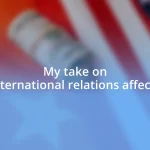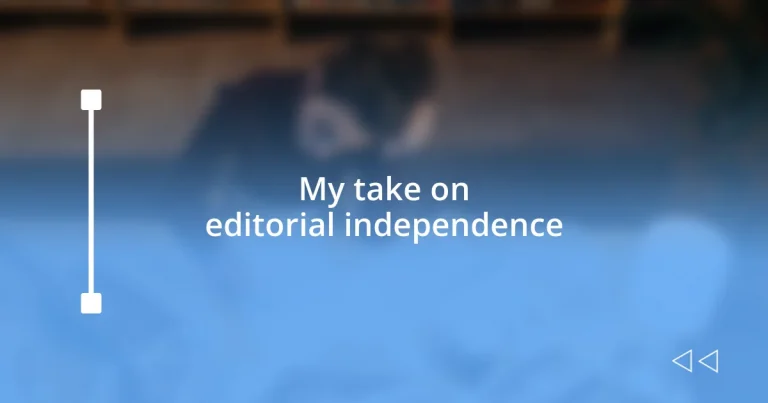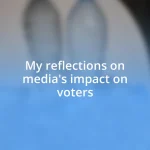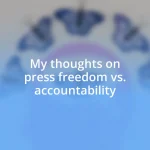Key takeaways:
- Editorial independence is crucial for credible journalism, serving as a safeguard for democracy and enhancing public trust.
- Challenges to independence include financial pressures, corporate ownership, political influence, and societal expectations which can compromise journalistic integrity.
- Successful case studies demonstrate that maintaining independence allows for impactful reporting and drives meaningful societal change.
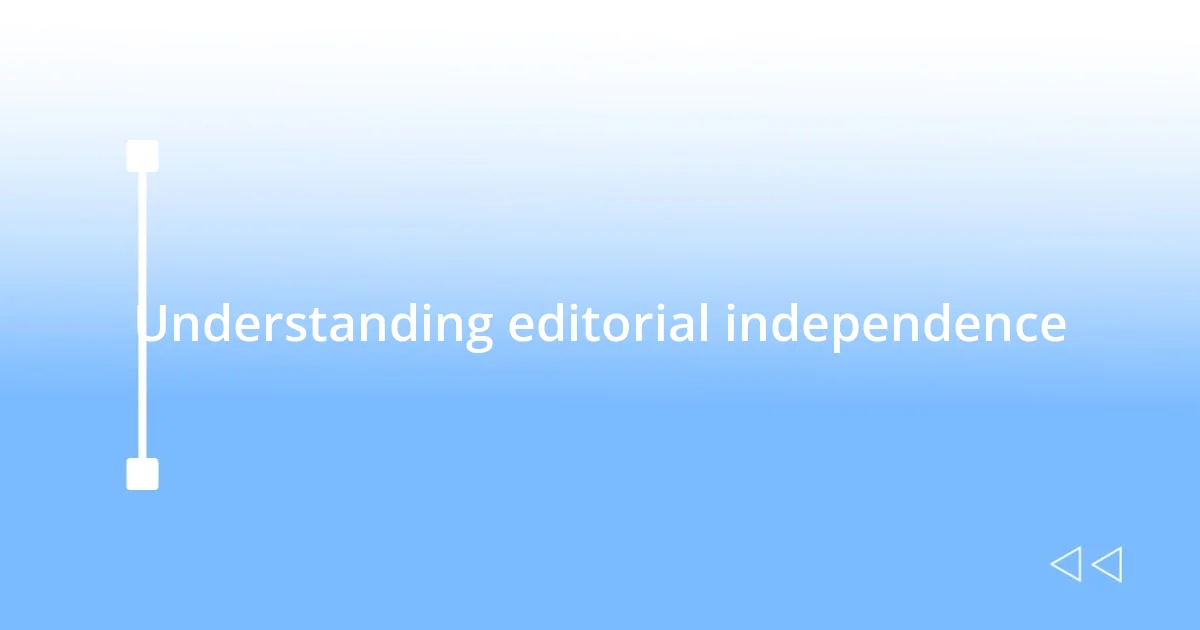
Understanding editorial independence
Editorial independence is essentially the freedom for journalists and editors to report and express news without undue influence from external forces, be it advertisers, political entities, or even owners of the media outlet. I remember my early days in journalism, feeling an overwhelming pressure from some stakeholders who wanted to shape narratives. It struck me then how crucial it is to maintain that independence to uphold the integrity of storytelling.
When I think about editorial independence, I often ask myself: what would happen to the truth if it were constantly colored by outside interests? This question resonates deeply, especially when I consider some high-profile cases where journalists faced backlash for reporting inconvenient truths. In those moments, I felt a strong connection to the idea that our role goes beyond just reporting; it’s about serving the public interest and holding power accountable.
In practice, achieving editorial independence isn’t always straightforward. I’ve witnessed firsthand the challenges that arise when financial pressures collide with journalistic ethics. That tension is palpable. It invites a necessary introspection: how can we ensure our stories remain untethered to influence while still sustaining our platforms? This dance between survival and integrity is a critical aspect of the conversation about editorial independence.
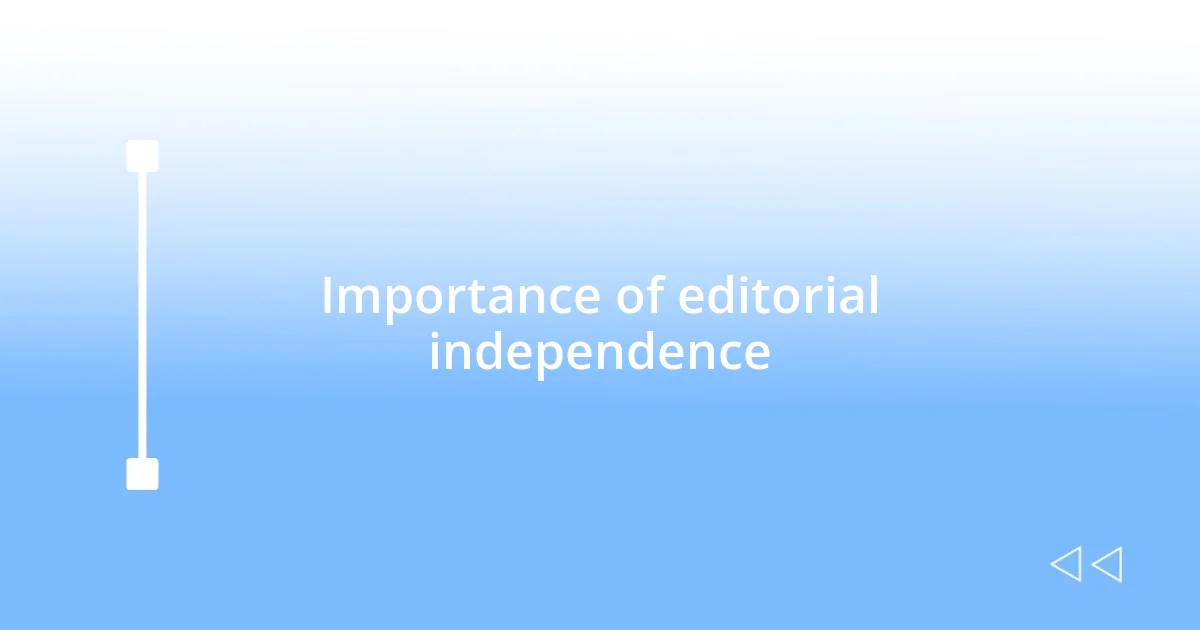
Importance of editorial independence
The significance of editorial independence cannot be overstated. It’s the bedrock of credible journalism and a vital safeguard for democracy. I recall a time when a colleague faced immense pressure from advertisers to tone down a critical piece on a major corporation. It was alarming to see how close we were to compromising our integrity just for the sake of financial support. This experience reinforced for me that when editorial independence is compromised, the essence of truth and accountability is jeopardized.
Moreover, editorial independence enhances public trust. Audiences can discern when a story might be unduly influenced, and they will naturally gravitate towards outlets that maintain a strong commitment to fair reporting. I remember launching a new investigative piece that took a hard look at local government practices. The positive feedback from readers who appreciated our unfiltered approach felt invigorating. It showed me how empowerment through independence can resonate with the community, leading to informed citizenry and meaningful dialogue.
Lastly, editorial independence also fosters creativity and diversity in media narratives. When content creators aren’t shackled by external pressures, they can explore stories from unique perspectives and experiment with different formats. I once participated in a project where we were free to pursue offbeat human-interest stories, which proved to be some of the most rewarding work I’ve done. Not only did that independence spark creativity, but it also allowed us to connect with our audience on a more profound level.
| Key Aspect | Impact |
|---|---|
| Credibility | Essential for trustworthy journalism |
| Public Trust | Builds confidence in media outlets |
| Creativity | Encourages diverse narratives and unique perspectives |
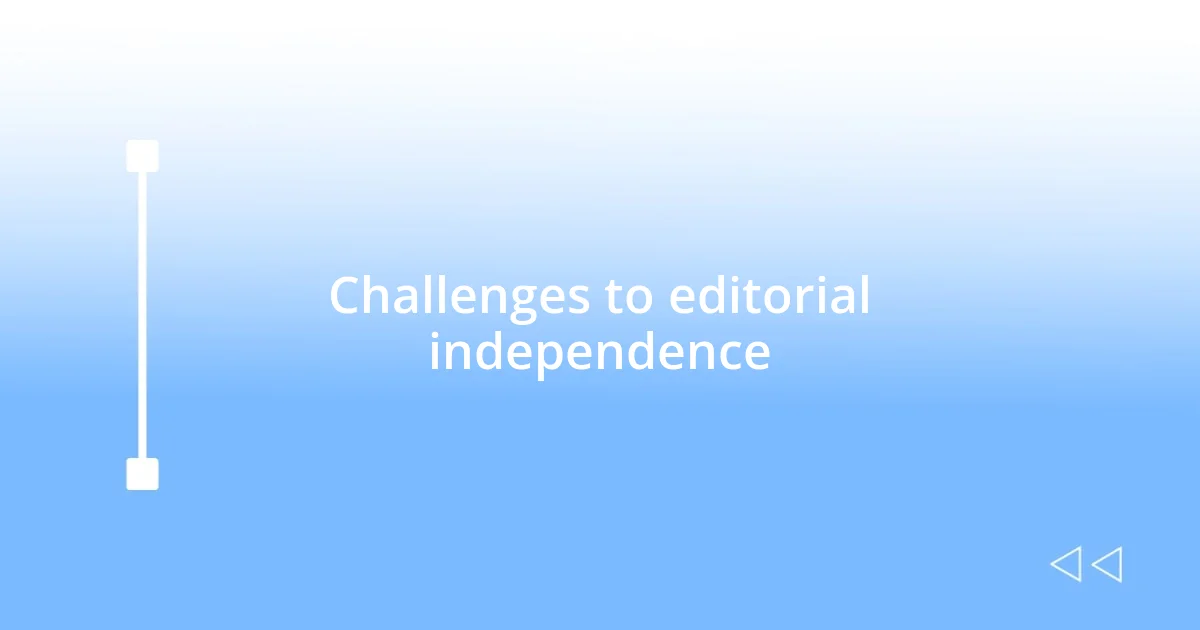
Challenges to editorial independence
There are numerous challenges that threaten editorial independence, and I’ve encountered several of them throughout my career. One of the most significant obstacles comes from the ownership structure of media outlets. When owners have vested interests—be it political or financial—reporters can feel the weight of pressure, subtly stifling their ability to pursue stories that go against those interests. I remember a particular instance when a major story was softened during editorial review simply because it contradicted our owner’s public stance. That experience highlighted just how insidious the challenge can be.
Some common challenges include:
- Financial Pressures: Reliance on advertising revenue can lead to compromised editorial choices.
- Corporate Ownership: Media companies owned by influential figures may tailor reporting to appease their interests.
- Political Influence: Government entities may exert pressure on journalists, threatening funding or access to information.
- Public Backlash: Negative reactions from audiences can cause self-censorship in fear of losing support or subscribers.
Beyond these common challenges, I can’t help but reflect on how societal expectations also play a role. In an era of polarized opinions, I’ve witnessed firsthand how the public’s demands for particular narratives can shape editorial choices. It can feel like walking a tightrope; I want to engage readers without sacrificing journalistic integrity. The emotional toll of navigating this landscape is real, and it serves as a constant reminder of why defending editorial independence must be a priority.
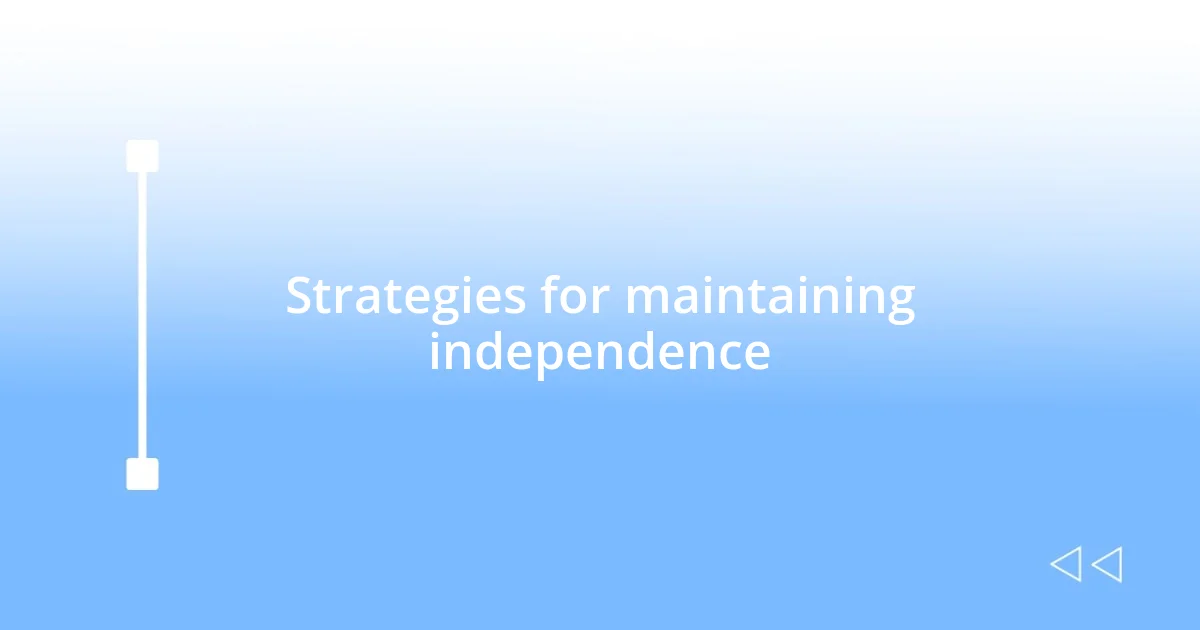
Strategies for maintaining independence
One effective strategy for maintaining editorial independence is to establish a clear code of ethics. In my experience, having a predefined framework helps journalists navigate tricky situations. I remember a time when we faced pressure to alter an article based on a sponsor’s preferences. We turned to our code, which emphasized truth and objectivity. It became our compass, allowing us to push back confidently against external influences.
Another vital approach is to diversify funding sources. When I worked at a nonprofit media outlet, we relied not just on advertising but also on grants and donations from individuals who believed in our mission. This financial independence shielded us from the whims of advertisers, letting us focus solely on our journalistic integrity. It made me realize how empowering it is to have multiple avenues of support; it’s like having a safety net that allows you to pursue stories without fear of losing funding. How often do we overlook the power of broadening our financial base?
Lastly, fostering an open dialogue within the newsroom can be crucial. I vividly recall team meetings where we shared our concerns about editorial influences, allowing everyone to voice their feelings and thoughts. This transparency not only built trust among team members but also equipped us to address challenges collaboratively. By creating an environment where everyone feels safe to express their opinions, we nurtured a culture of independence. What better way to solidify a commitment to integrity than to encourage ongoing conversations about it?
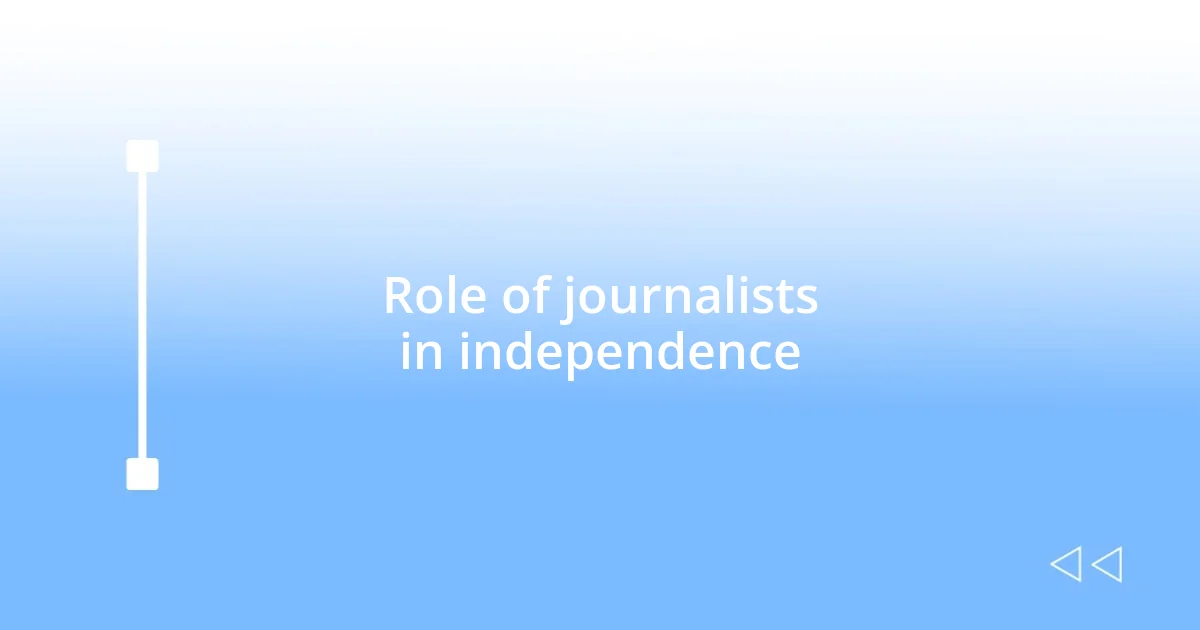
Role of journalists in independence
Journalists play a pivotal role in upholding independence by embodying the values of integrity and accountability. I’ve always believed that, at the core, journalism thrives on truth-telling. I recall a particular project where our team covered a contentious issue that sparked fierce debates in the community. Instead of shying away, we committed to presenting all viewpoints, which allowed us to serve our readers faithfully without the fear of repercussions. This experience reinforced my understanding that our responsibility goes beyond just reporting—it’s about empowering the audience with information.
Moreover, journalists serve as watchdogs in society. It’s fascinating how, in moments of silence or fear, our voices can become a rallying point for the vulnerable. I remember investigating a local government decision that could adversely impact a marginalized group. Even when faced with pushback from officials who felt threatened, I stood firm, believing that my role was to protect those who felt unheard. There’s an undeniable sense of fulfillment that comes when you realize your work can drive change and hold power to account.
However, the emotional landscape of journalism is complex. There are times when the struggle for independence feels overwhelming. I once left a meeting where the pressure to conform was palpable, and I questioned my purpose. But I’ve found that validating those feelings is vital. It reminds us that, while we strive for independence, we are also human, navigating a challenging terrain. So, what keeps us going in those tough moments? For me, it’s the knowledge that each time we choose integrity over convenience, we contribute to a healthier public discourse.
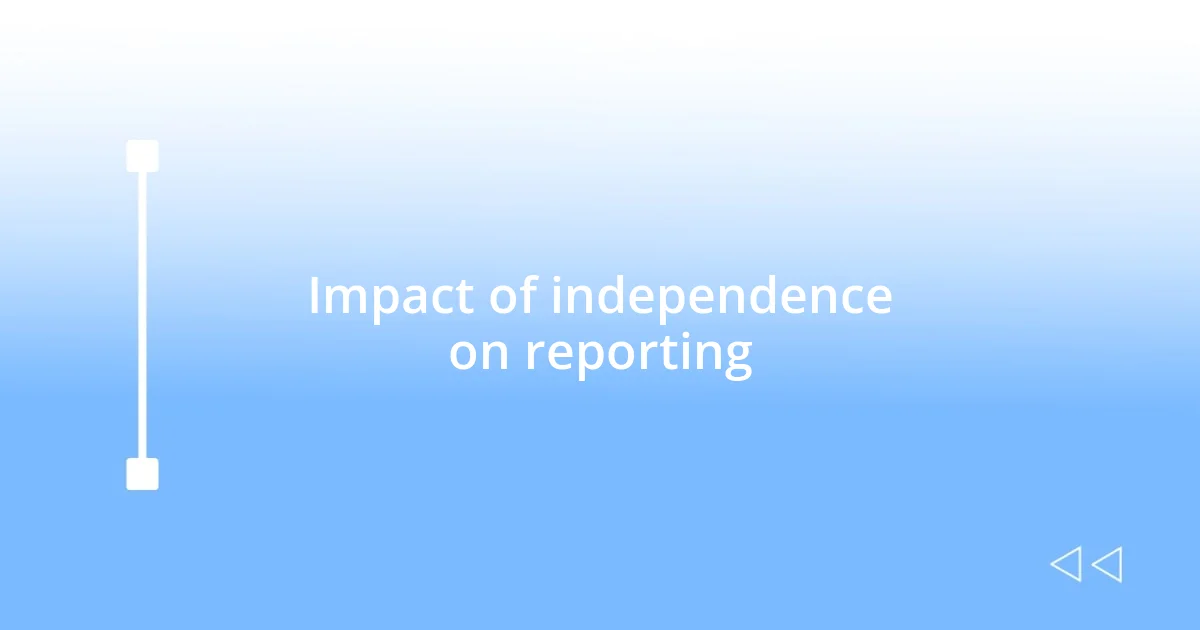
Impact of independence on reporting
The impact of editorial independence on reporting is profound and far-reaching. I remember covering a sensitive issue where external pressures tried to skew the narrative. With independence at the forefront, we reported the facts transparently, which not only earned the trust of our readers but also empowered us to be the voices for those who felt overlooked. Have you ever felt that weight of responsibility? It’s truly invigorating when journalists stick to their mission, remembering that the audience deserves honesty over convenience.
When reporters are free from external influences, the quality of the reporting flourishes. I’ve seen first-hand how a lack of bias allows for deeper exploration of topics, unveiling nuanced perspectives that might otherwise be ignored. For instance, during an investigative piece, we encountered unexpected patterns that emerged when we followed the facts without fear. Isn’t it amazing how allowing the story to guide us, rather than outside pressures, can lead to enlightening revelations? It makes all the difference in crafting a narrative that’s not just informative but transformative.
Ultimately, the environment created by an independent editorial stance fosters resilience in reporting. There was a time when we faced backlash from a powerful figure for our critical coverage. Instead of retreating, we rallied together, empowered by our shared commitment to truth. In those moments, I felt the strength of our convictions and the necessity of our work. How often do we underestimate the positive ripple effects of staying true to our principles? The challenges may loom large, but the growth and integrity that come from independence make the journey worthwhile.
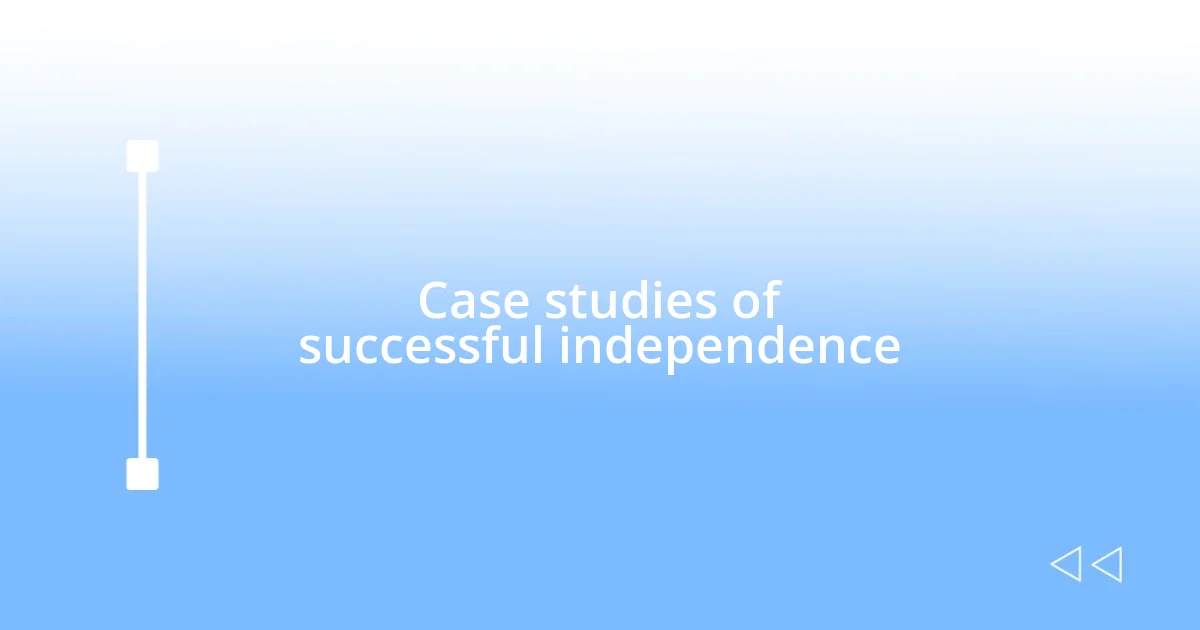
Case studies of successful independence
One striking example of successful editorial independence that comes to mind is a non-profit news organization I had the opportunity to work with. The team fought relentlessly against corporate influence, relying solely on reader funding. I vividly recall an instance where we exposed a major environmental issue affecting our community. Unlike many outlets that might have shied away due to pressure from advertisers, our unyielding commitment to the truth allowed us to amplify unheard voices, sparking public support and tangible policy changes. Isn’t it inspiring to witness the direct impact that courage and independence can have?
Another compelling case is a regional news outlet that embraced a completely ad-free model to maintain editorial integrity. I attended a panel discussion where they shared insights about their approach. They tackled sensitive issues without the fear of losing funding sources, showcasing gritty reporting that resonated deeply with their audience. I admired how their independence created a safe space for honest dialogue, which helped build trust within the community. It got me thinking—what would our reporting look like if we prioritized truth over financial backing?
Perhaps one of the most heartwarming stories I’ve encountered was from a journalist who dedicated a year to investigating local educational inequities. Amazingly, their findings led to a statewide initiative for reform. The freedom to pursue stories without interference allowed them to create a narrative that was both humanizing and impactful. Reflecting on this, I can’t help but wonder: how many stories lie untold simply because of outside pressures? It’s a reminder that editorial independence is not just a principle; it’s a vital practice that can drive meaningful change in our society.








